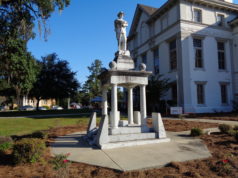I have a modest proposal for breaking the political paralysis that grips Washington like a cold, dead hand slowly contracting around Uncle Sam’s throat.
Start doing public business in places where elected officials can actually make deals and get things done — in secret meetings.
The reason nothing gets done in Washington anymore is not, as commonly supposed, due to the lack of civility in the national political conversation. The national political conversation has never been particularly polite, and it has been a lot less civil in the past than it is today.
Nor is it due to the influence of special interests or special interest money in Washington, nor to the existence of horse trading, log rolling, back scratching or the pork barrel. Those things have all been around at least since the word politikos entered the Greek language.
The real reason nothing gets done in Washington anymore is that the capacity to compromise has largely been lost. The reason politicians don’t compromise anymore isn’t that they don’t know how to compromise. Most successful politicians have an innate understanding of how to compromise; it comes with being sufficiently well socialized to get elected. It is that the American political system currently is structured in such a way that they can’t compromise.
Specifically, it has become nearly impossible for politicians to do anything in secret anymore. Unfortunately, meaningful political compromises can only be negotiated in secret, and the bigger the compromise, the more secret the negotiations have to be.
A National Secret Meetings Act would be an important step toward restoring a robust level of secrecy to public life.
Such a law would be the opposite of the “open meetings” laws (sometimes called “sunshine laws”) that progressives and journalists are obsessively fond of.
A National Secret Meetings Act would not only allow important public deliberations to be conducted in secret, it would mandate closed meetings when “matters of national importance” are being considered. It would also provide that politicians who leak the proceedings of such meeting be removed from office for doing so and subject to criminal penalties. “Matters of critical national importance” would include things like the federal budget, taxes, entitlements, health care, national defense, global warming and whether the NCAA should hold a tournament to determine college football’s national champion. More mundane matters, like a resolution declaring Michael Bloomberg’s birthday National Learned Helplessness Day, would still be considered in public.
For more than a generation, it has been a received truth in American politics that “the public’s business ought to be done in public” and that open meetings are an unqualified good. And for more than a generation political polarization and gridlock has been on the rise, and the ability of political leaders to solve problems has been in a death spiral.
The reason is simple. Solutions to big, important national problems can rarely be fashioned without leaders agreeing to compromises that require them to abandon core beliefs and break longstanding political promises for the common good.
Politicians can’t make those sorts of compromises in public. That’s because if politicians are seen using core beliefs and promises as bargaining chips — say opposition to tax increases in the case of Republicans, or opposition to entitlement cuts in the case of Democrats — their base supporters will tear them to pieces.
Here’s a dirty little political secret: Politicians who go into negotiations saying, “We’re prepared to compromise, but we won’t compromise on principles,” are lying to you or lying to themselves. The truth is that any negotiation that doesn’t put core principles and values on the table isn’t worth the haggling time.
Negotiations that will produce the sort of “statesman-like” compromises that most Americans would like to see can only be fashioned behind closed doors — where negotiators can speak with brutal candor without fear of blow-back, and where anything and everything can be put on the table and taken off it as required in the course of negotiations.
To be sure, there are those who will argue that no good ever comes out of secret negotiations.
Hogwash. The single most important political negotiation in American history was conducted entirely in secret. That was the negotiation that took place in Philadelphia from May 25 to Sept. 17, 1787. It produced the United States Constitution. The Constitutional Convention’s first order of business (after electing George Washington as president of the Convention) was to close its deliberations to the public and swear all members to secrecy.
The convention was attended by some of the greatest and most passionate revolutionaries in human history.
Compromise is often an acquired taste with such men. Yet the document they created was a towering work of political compromise — and it was all done in secret. Most historians agree that it couldn’t have been done in public.
Here’s how the late historian Catherine Drinker Bowen described the convention in her 1966 book Miracle at Philadelphia:
“In the Constitutional Convention, the spirit of compromise reigned in grace and glory. As Washington presided, it sat on his shoulder like the dove.
Men rise to speak and one sees them struggle with the bias of birthright, locality, statehood. … One sees them change their minds, fight against pride and, when the moment comes, admit their error.”
If you doubt the value of closed meetings for fashioning compromises for the public good, ask yourselves this question: Do you think the Philadelphia convention would succeed in producing the Constitution if it were held today and its sessions were open to the public and to swarms of journalistic harpies hyper-ventilating over every twist and turn in the deliberations?
Closed meetings don’t guarantee that attempts at compromise will succeed. However, open meetings all but guarantee that they will fail.
Respond: [email protected] This opinion column does not necessarily reflect the views of Boulder Weekly.














